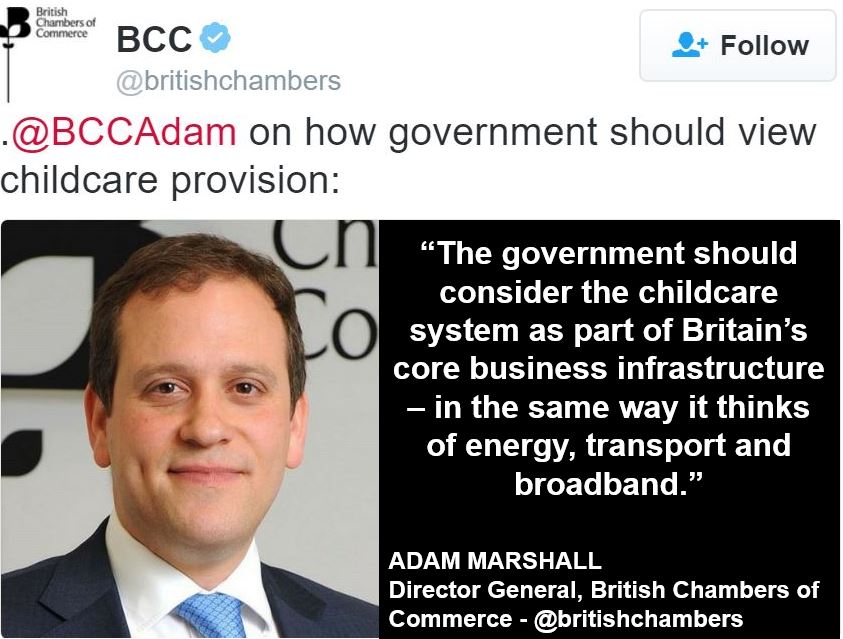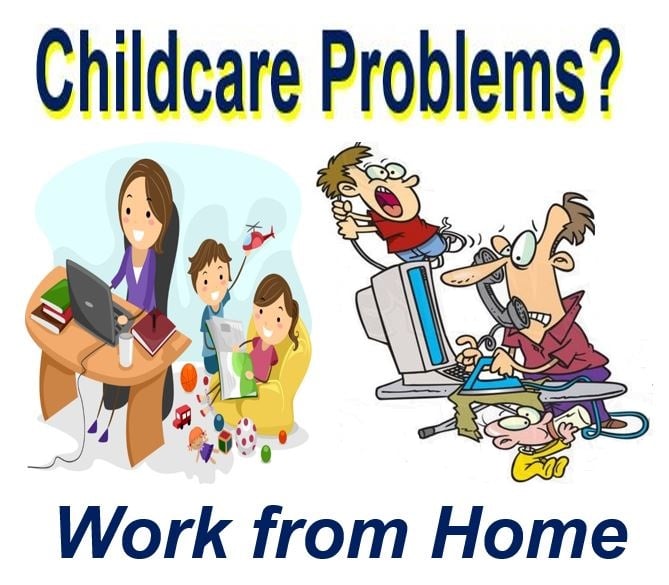Childcare costs are not only a problem for parents with children, but also for UK companies, who report that a significant number of employees are working fewer hours. Many employers say another problem is employees simply quitting because childcare is so expensive – they tell their companies that they are better off if they leave their jobs.
The British Chambers of Commerce, together with Middlesex University, carried out a survey of business opinion on the availability and cost of childcare, as well as the impact it has on the workforce.
According to its latest survey, which was published today (Sunday), thirty-three percent of employers regard the availability of childcare as a major obstacle in the recruitment and retention of personnel.
 If a business has problems with access to energy, broadband and transport, its profits will be significantly affected. The Government needs to see childcare in the same way – as one of the core components of business infrastructure. (Image: adapted from twitter.com/britishchambers)
If a business has problems with access to energy, broadband and transport, its profits will be significantly affected. The Government needs to see childcare in the same way – as one of the core components of business infrastructure. (Image: adapted from twitter.com/britishchambers)
Childcare costs hurting companies too
The survey, which included over 1,600 business leaders across Britain, also showed that 28% of companies are reporting declines in the number of working hours due to the high cost of childcare. Nine percent of respondents said they have had workers resign because of childcare costs.
Thirty-nine percent of companies in the survey believe that the government’s plans to double the number of free childcare places next year will be good for their businesses.
The British Chambers of Commerce is urging the government to do more – to consider the costs and benefits of a universal childcare entitlement all the way up to school entry age. Such a measure would help more employers retain and promote productive employees, and help working parents progress.
Childcare costs – Key findings
– 33% of companies regard the availability of childcare as an important issue in hiring and retaining staff.
– When asked to report on problems due to the cost and availability of childcare, 28% of respondents reported a decline in working hours, 12% saw a reduction in productivity, 9% said they had workers resign, and 8% said some staff changed roles within the firm.
 Teleworking means working from home or at a local telework centre. If your company allows it and you are the type of person who can motivate yourself on your own, you might resolve your childcare problems by teleworking.
Teleworking means working from home or at a local telework centre. If your company allows it and you are the type of person who can motivate yourself on your own, you might resolve your childcare problems by teleworking.
– 39% of employers think that the doubling of free childcare places next year will be good for their business and will improve their ability to recruit staff.
– 35% of respondents said the doubling of childcare next year will help them be more successful in retaining key personnel.
Adam Marshall, Director General at the British Chambers of Commerce, said regarding these findings:
“Firms across the UK are losing talented staff, often because of the availability and high cost of childcare.”
“At a time when economic growth is softening, and skills gaps and recruitment difficulties are hindering businesses, the government should consider the childcare system as part of Britain’s core business infrastructure – in the same way that it thinks of energy, transport, or broadband.”
 According to the Money Advice Service: “The cost of childcare varies depending on the type of childcare and your location.”
According to the Money Advice Service: “The cost of childcare varies depending on the type of childcare and your location.”
“Government must take a clear and detailed look at the costs and benefits of a universal childcare entitlement, to bridge the gap between parental leave and the start of school. This could take the form of a family account that enables parents to select the support that’s right for their working patterns from the market. In time, this could help businesses raise productivity, and help more parents stay in work. As businesses have evolved to become more flexible, government policy should also evolve – to help as many working parents as possible stay in the workplace.”
“Expanded childcare options are good for families, good for businesses, and good for the economy.”
Director of Corporate Engagement at Middlesex University, David Williams, added:
“Our research highlights that childcare is a fundamental issue for many employers.
“Businesses need to retain talented staff and with the renewed focus from the Government on upskilling the workforce particularly around apprenticeships and corporate degrees it is crucial that there is sufficient affordable childcare available for employees who are studying to help fill the skills gaps.
“The childcare support available for those studying needs to be simplified and made clearer for all to help tackle gender inequality and maintain diverse workforces.”
